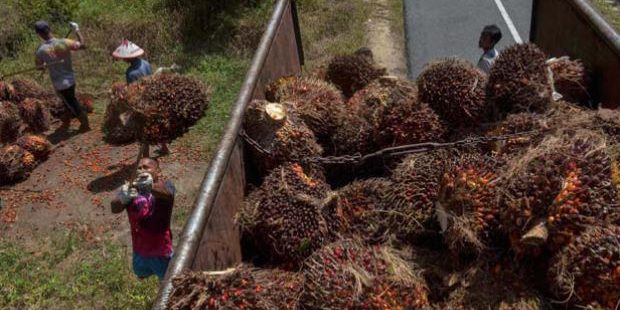THE JAKARTA POST/JAKARTA The government is lacking in strong measures to fight tariff barriers implemented by several palm oil export destinations, including India and the European Union, Indonesian Oil Palm Association (GAPKI) chairman Joko Supriyono has said.
The country’s number one export commodity continues to face criticism over sustainability, such as deforestation issues raised by the eurozone, and has been hurt by trade barriers from its major importers, including India.
“The international demands over our palm oil sustainability have become so complex and are no longer purely addressing the sustainability issue itself, so we have to push our campaigning and lobbying efforts […] and use trade instruments to resolve trade barriers at the international level,” said Joko at a palm oil seminar recently.
He criticized the lack of bilateral trade agreements between Indonesia and major palm oil importers, such as India, the EU, China and Pakistan, which has dented the country’s competitiveness. Indonesia has only a preferential trade agreement with Pakistan and no bilateral agreements with the rest of those countries.
India is the largest market for Indonesia”s palm oil with 6.71 million tons of products exported there in 2018, followed by the EU, China and Pakistan by 4.78 million, 4.41 million and 2.48 million tons, respectively.
India now imposes a whopping 50 percent import tariff on palm oil products, including those coming from Indonesia. The duties had made the country”s palm oil lose out to competition from Malaysia, which is also one of the largest palm oil exporters in the world, as Kuala Lumpur has inked a trade agreement with New Delhi and enjoys a lower tariff of 45 percent.
The EU, the second largest export market for Indonesia, will impose temporary duties of 8 to 18 percent on biodiesel imports produced by Indonesian companies starting Sept. 6 on allegations that palm oil companies in Indonesia receive various incen tives and special subsidies from the government.
This news comes just months after the European Commission decided that all palm oil products, including biofuel, should be phased out by 2030 due to deforestation concerns.
During a recent visit to The Jakarta Posfs office in late July, Joko stressed the importance of lobbying efforts and strong trade measures to respond to such barriers.
“In addition to taking them to the World Trade Organization for dispute settlement, Gapki has advised the government to lobby the EU,” he said. “Other than that, we are thinking of trade retaliation measures but this is a dilemma because some people say those actions violate WTO regulations.”
Coordinating Maritime Affairs Minister Luhut Pandjaitan in March said the government would strongly oppose the EU”s plan to phase out all palm oil products. He also mentioned Indonesia”s US$40 billion orders of French-made Airbus airplanes and the possibility of diverting the orders if trade rela tions between the countries were disrupted.
“We will not use retaliation as long as we can still attempt negotiation. But, if it is needed, it [retaliation] will be used as a last resort,” Luhut said in Jakarta on Tuesday as reported by kompas.com.
The deliberations of the Indonesia-European Union Comprehensive Economic Partnership Agreement (IEU-CEPA) seems to have yet to reach a conclusion as the Trade Ministry had said it would comprehensively review the agreement following the EU”s decision to phase out palm oil products by 2030.
At the same time, efforts to ensure the country’s palm oil products are in line with the global market’s sustainability requirements by implementing Indonesia Sustainable Palm Oil (ISPO) certification seem to have hit a snag. The government had intended the ISPO to compete with the internationally-acknowledged Roundtable on Sustainable Palm Oil (RSPO).
But, since the program’s implementation rolled out in 2011, the majority of palm oil plantations, particularly those owned by smallholders, have yet to be certified.
Coordinating Economic Minister Darmin Nasution said during the palm oil discussion with GAPKI that the government had planned to issue a presidential regulation (Perpres) in a bid to further enforce the ISPO certification program. The Perpres, which was expected to be issued by year-end, would stipulate a provision that the government would bear the costs incurred in obtaining the ISPO certification for smallholder farmers.
“More than 40 percent of Indonesia”s palm oil output comes from smallholder farmers, but only 0.1 percent of their plantations have been ISPO certified,” Darmin added.
The certification of the smallholder’s plantations, he stated, was expected to shield Indonesia”s palm oil industry from continuous negative campaigns, particularly those related to deforestation issues. Prima Wirayani contributed to this story.










